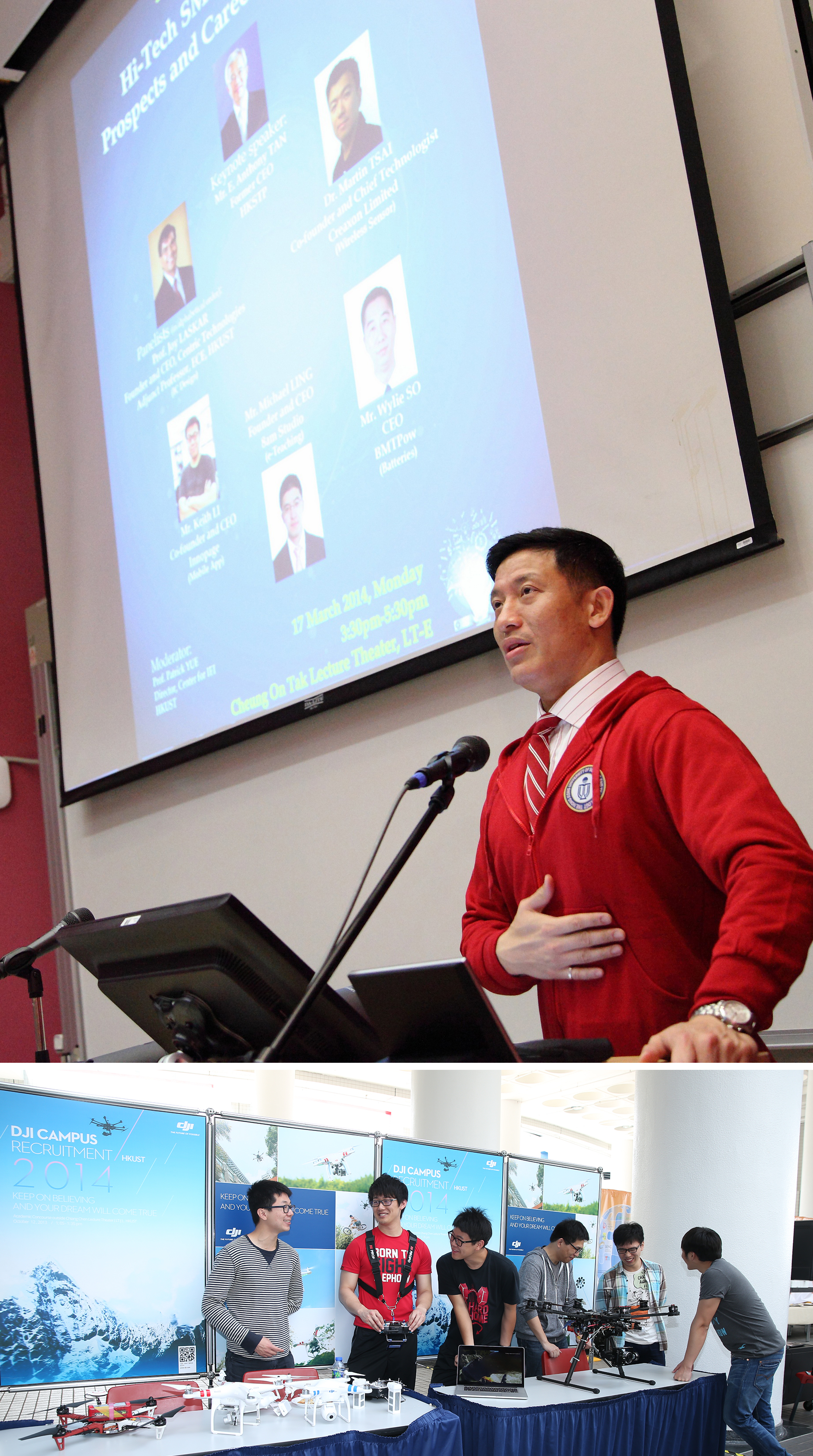 |
| Associate Provost for Knowledge Transfer Prof Patrick Yue, and members of DJI, a HKUST spin-off and unmanned helicopter market leader. |
|
As the first person to step into the recently established role of Associate Provost for Knowledge Transfer, Prof Patrick Yue has an enterprising task. Alongside HKUST’s two key missions of education and research, he will be seeking to drive forward the University’s “third pillar” of innovation on campus and its leadership role in this area within the wider community.
Hong Kong and regional development
HKUST is committed to nurturing innovation and the transfer of its academic research for public benefit and enhancing the economic, technological and social development of Hong Kong and the region. Since its establishment, it has created a substantial knowledge transfer infrastructure, covering collaborative research, contract research, consultancies, IP management, technology licensing, executive and continuing education, professional training, entrepreneurship and business incubation. Among its many success stories to date are the eco-friendly SANI sewage treatment process, Lavinet wireless system for higher efficiency in aircraft maintenance, and numerous University-industry projects and research centers; spin-offs and start-ups such as unmanned aerial systems market leader DJI, and RFID technology provider NeoID; and an annual HKUST One Million Dollar Entrepreneurship Competition.
"HKUST has already set in motion an impressive range of activities related to the transfer of research findings, commercialization, and entrepreneurship across the University’s fields of exploration,” Prof Yue said. “What we now hope to do is to unify and simplify our knowledge transfer platform in order to most effectively tap internal inspiration and resources, link up our faculty, students and alumni with external networks, and explore funding opportunities to help bring their ideas to market.”
Prof Yue’s appointment includes oversight of the Technology Transfer Center, which manages and protects HKUST’s intellectual property, and the HKUST R and D Corporation Limited, which handled a total of 260 R&D projects serving industry, government and other sectors in 2012-13. The Entrepreneurship Center, providing education and training, and incubation for start-ups, is also part of his scope.
From Silicon Valley to HKUST
It is a vision and mission well suited to Prof Yue, who hails from the start-up culture of Silicon Valley and is a successful entrepreneur, investor, as well as leading academic in his field of electrical engineering. After his doctoral degree at Stanford University, he became involved in two start-ups, including Atheros Communications, which went public on NASDAQ in 2004 and was later acquired by Qualcomm Inc. During this time, he moved into academia full time. In 2010, he joined HKUST’s Department of Electronic and Computer Engineering and became Founding Director of the School of Engineering’s Center for Industry Engagement and Internship in 2012. His main research and technology interests are high-speed wireless and optical communication integrated circuit design, and achievements include 13 issued US patents.
Diverse innovation portfolio
One focus of Prof Yue’s new role is to encourage high-potential research and development with varying time horizons to bring wider diversity to the University’s innovation portfolio and steady output. For example, software may only take one to two years to market, while hardware technology developments often need five to seven years, and science breakthroughs could require more than 10 years. It will also look beyond products. “Innovation is not just about smart phones and science discoveries. It encompasses novel ways of doing business – such as Alibaba’s success story of reducing transaction costs – and interdisciplinary approaches involving social science and the humanities,” he pointed out. “We want to open up that electrifying sense of possibility.”
Lasting impact
Prof Yue sees such support to be of lasting significance for the University’s future within the campus and beyond. "Spending time and tremendous effort in fostering such an enabling environment can bring a lasting sense of belonging to HKUST. Those who experience such active support will remember this. Subsequently, they would be willing to offer their assistance to future generations of young creators. It can raise HKUST’s innovation profile inside and outside the campus, and help to extend the impact of the University’s work on wider community development."
|